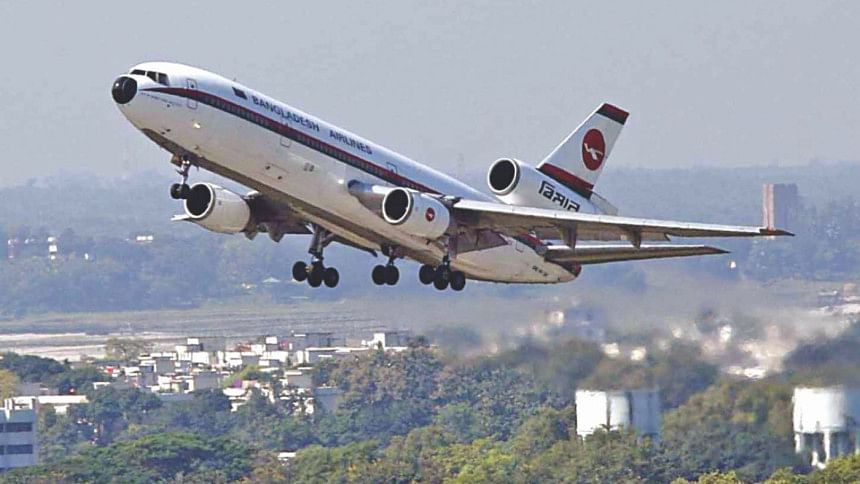Open, troubled skies!

AS a new CEO just assumed office in Biman, it's deja vu all over again at a time when the airline industry is still suffering from an acute lack of direction. Quite like his predecessor, his fate may also be reduced, if not doomed to responsibility without authority. But there are other concerns, too.
Concerns surrounding the business reasons are far more compelling than regulatory agencies will have us believe. The litmus test of strategies is reflected in the outcome of adopted policies and revisiting to tailor those to dramatically changing needs. Domestic airlines, too, are oblivious of what continues to bedevil the very feasibility of their operations.
A double edged sword
The tell-tale signs of misdirected policies are all too obvious. A proper air traffic hub, for instance, has failed to develop. The business potential of airlines of Bangladeshi origin either remains stymied or their very existence is at stake. And one only has to look around to conclude that without a proper air traffic hub, it is impractical to expect an airline to succeed. The rationale applies in reverse as well. A hub also cannot succeed without a vibrant domestic airline. The success of any international airline is predicated on the success of the hub that it is housed in or operates from. But conditions are nothing short of an oxymoron for Bangladeshi airlines on their home turf.
Open-ended operation
A laissez faire policy in the way that airlines of other countries are allowed to operate in Bangladesh does not allow a level playing field. Carriers of Middle Eastern or Western Asian origin seem to enjoy frequency of flights that totally misrepresent or are far in excess of what the demand of the market would suggest.
Glut of seats have a profound effect
When airlines are allowed to operate a number of flights on a route that is totally disproportionate to market demand it inevitably has a telling and severe effect on the viability of the airlines' operation. It triggers a glut of seats, as does fare wars, dilution of revenues and eventual discontinuation of services. It is not only that the economic viability of airline operation is in jeopardy. The very existence of these domestic airlines is also at stake.
The latitude or flexibility allowed to Middle Eastern / Western Asian airlines encourages them to target long haul traffic to and from Europe and USA which is rightfully the mainstay of the business of direct bilateral operators operating on those long haul routes. The imbalance created throws the market into disarray.
Tragic effects
The effects are tragic in that bilateral 'direct' carriers are forced to discontinue operations against the backdrop of highly aggressive methods employed by the 'intermediate' carriers as a result of the inordinately high number of flights allowed them in the first place. Indirect carriers also resort to their abundance of resources and incur marketing costs at will and with scant regard to operating costs like jet fuel that play havoc on the fate of direct bilateral operators.
Equitable distribution of flights
Equitable distribution of flight frequencies based on market demand is a time honoured universal practice for assessing seat requirement and to avoid market anomalies. It is also a safeguard against arm twisting techniques that Big League carriers are known to employ on smaller airlines to weed out competition or even result in their extinction. Some of big league carriers have now assumed behemoth proportions capable of shooing in elements of oligopoly and unfair competition.
But how does it affect Bangladesh?
It is more than just a red line that defines the difference between competition in the Open Skies and the opportunity of Fair competition. Open Skies policy is a myth or fallacy at best. Anomalous practices allowed to others place airlines of Bangladesh origin into hazardous position that is hastened by under-utilization of newly acquired aircraft. The leeway allowed to operators to fly in with frequencies disproportionate to market demand force direct operators like Biman or other airlines of Bangladesh origin to withdraw operation of flights.
It was easy to discontinue flights with (written off) DC10 aircraft as a quick fix. In the present day context, however, operation of flights with newly acquired or leased aircraft must be kept buoyant and ongoing --- for the principal reason of debt servicing, if not anything else. Carriers like Biman are forced to consider borrowing from banks to pay wages and salaries while also debt servicing the loans. Origins of this anomaly lie in the open-ended and lopsided benefits enjoyed by the intermediate or foreign carriers than what the interplay of market forces would normally suggest.
Glaring legitimisation
Bangladeshi carriers lose out on potential revenues that are legitimately theirs but made to be conveniently legitimate for others. The national carrier of Bangladesh, for example, was forced to pay royalties to Big League carriers in the past whereas lop sided effects favouring certain carriers are now affecting them in their home market.
Other effects
Going out of the way to allow opportunities to other carriers at the expense of Bangladeshi airlines also compromises with the aim of developing a vibrant hub at Dhaka. Any chance of correction becomes remote with others gaining from the plight of domestic carriers. Circumstances are far from being a level playing field for the carriers of Bangladeshi origin. Conditions must be set right for the national carrier as well to showcase Bangladesh's economic growth in the economy. It behooves common sense why a suitably crafted aviation policy cannot be introduced. Both the aviation industry and the national economy can benefit from it.
It is of crucial strategic interest.
The writer is an airline marketing executive.

 For all latest news, follow The Daily Star's Google News channel.
For all latest news, follow The Daily Star's Google News channel. 



Comments